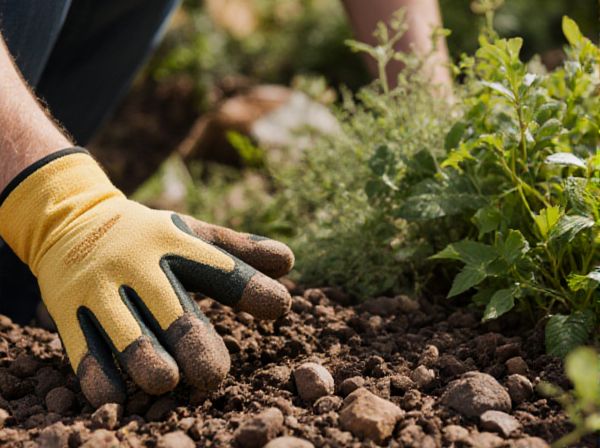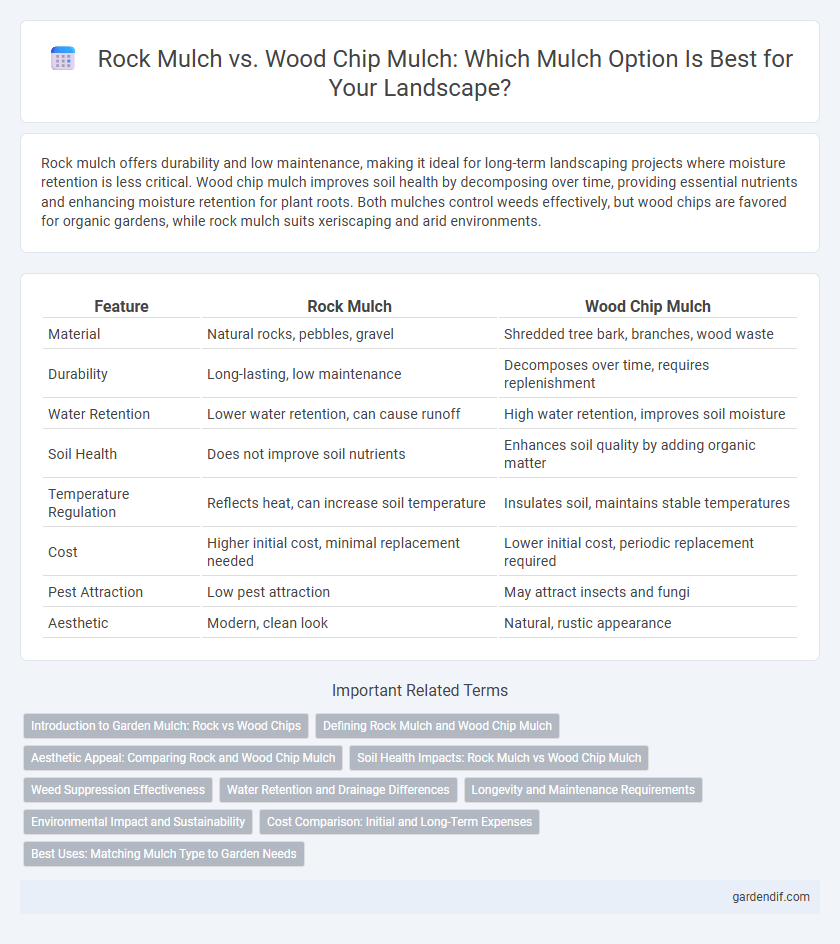
Rock Mulch vs Wood Chip Mulch Illustration
Rock mulch offers durability and low maintenance, making it ideal for long-term landscaping projects where moisture retention is less critical. Wood chip mulch improves soil health by decomposing over time, providing essential nutrients and enhancing moisture retention for plant roots. Both mulches control weeds effectively, but wood chips are favored for organic gardens, while rock mulch suits xeriscaping and arid environments.
Table of Comparison
| Feature | Rock Mulch | Wood Chip Mulch |
|---|---|---|
| Material | Natural rocks, pebbles, gravel | Shredded tree bark, branches, wood waste |
| Durability | Long-lasting, low maintenance | Decomposes over time, requires replenishment |
| Water Retention | Lower water retention, can cause runoff | High water retention, improves soil moisture |
| Soil Health | Does not improve soil nutrients | Enhances soil quality by adding organic matter |
| Temperature Regulation | Reflects heat, can increase soil temperature | Insulates soil, maintains stable temperatures |
| Cost | Higher initial cost, minimal replacement needed | Lower initial cost, periodic replacement required |
| Pest Attraction | Low pest attraction | May attract insects and fungi |
| Aesthetic | Modern, clean look | Natural, rustic appearance |
Introduction to Garden Mulch: Rock vs Wood Chips
Rock mulch offers long-lasting durability and excellent weed suppression, making it ideal for arid climates and low-maintenance gardens. Wood chip mulch improves soil fertility by decomposing over time, enhances moisture retention, and supports beneficial microbial activity. Choosing between rock and wood chip mulch depends on garden needs, climate, and desired soil health benefits.
Defining Rock Mulch and Wood Chip Mulch
Rock mulch consists of small stones, gravel, or crushed rock used to cover soil surfaces, offering long-lasting erosion control and improved drainage. Wood chip mulch is made from shredded tree bark and branches, providing organic matter that enriches soil fertility and supports moisture retention. Both mulches serve distinct landscaping purposes, with rock mulch favored for durability and wood chips preferred for enhancing soil health.
Aesthetic Appeal: Comparing Rock and Wood Chip Mulch
Rock mulch offers a clean, durable aesthetic with a range of colors and textures that maintain their appearance over time without fading or decomposing. Wood chip mulch provides a natural, warm look that enhances garden beds with its organic texture and gradually decomposes, enriching the soil. Choosing between rock and wood chip mulch depends on whether a long-lasting, low-maintenance appearance or a natural, soil-enhancing finish is preferred.
Soil Health Impacts: Rock Mulch vs Wood Chip Mulch
Rock mulch offers long-lasting soil coverage and effective erosion control but lacks organic matter, resulting in minimal improvement to soil structure and microbial activity. Wood chip mulch decomposes over time, enriching soil with organic nutrients, enhancing microbial populations, and improving soil aeration and moisture retention. For optimal soil health, wood chip mulch supports nutrient cycling and promotes a thriving soil ecosystem, while rock mulch primarily serves as a physical barrier without contributing to soil fertility.
Weed Suppression Effectiveness
Rock mulch offers superior durability and does not decompose, providing consistent weed suppression over time, but it can allow weed seeds to lodge in gaps between stones if not properly maintained. Wood chip mulch effectively inhibits weed growth by blocking sunlight and enriching soil structure as it decomposes, though it requires periodic replenishment to maintain optimal weed control. Selecting between rock and wood chip mulch depends on balancing long-term maintenance needs with the desired level of organic soil improvement and weed suppression efficiency.
Water Retention and Drainage Differences
Rock mulch offers superior drainage, preventing water accumulation and reducing soil erosion, making it ideal for arid climates, while wood chip mulch excels in water retention by absorbing moisture and slowly releasing it to the soil. Wood chip mulch improves soil hydration and supports microbial activity, enhancing plant health in wetter environments. However, rock mulch does not decompose, providing long-lasting protection, whereas wood chip mulch requires periodic replenishment due to natural decomposition.
Longevity and Maintenance Requirements
Rock mulch offers exceptional longevity, often lasting decades without decomposition, which minimizes the need for frequent replacement and maintenance. Wood chip mulch decomposes naturally within one to two years, enriching soil but requiring regular replenishment to maintain effective coverage. While rock mulch demands less frequent upkeep, wood chips promote soil health and moisture retention at the cost of more frequent maintenance cycles.
Environmental Impact and Sustainability
Rock mulch offers long-term durability with minimal decomposition, reducing the need for frequent replacement but can contribute to soil heat retention and limited organic matter enrichment. Wood chip mulch improves soil health by decomposing naturally, enhancing nutrient cycling and moisture retention, though its sustainability depends on sourcing from responsibly managed forests. Choosing between rock and wood chip mulch requires balancing longevity with ecosystem benefits, favoring organic options for soil biodiversity and carbon sequestration.
Cost Comparison: Initial and Long-Term Expenses
Rock mulch typically involves higher initial costs due to material and installation expenses but offers greater longevity with minimal replacement needs, reducing long-term expenditures. In contrast, wood chip mulch has a lower upfront price and is easier to install but requires frequent replenishment every 1-2 years, increasing cumulative costs over time. Choosing between rock and wood chip mulch depends on balancing budget constraints with maintenance preferences and landscape goals.
Best Uses: Matching Mulch Type to Garden Needs
Rock mulch excels in drainage and weed suppression, making it ideal for xeriscaping, pathways, and areas prone to erosion. Wood chip mulch enriches soil fertility, enhances moisture retention, and supports garden beds and vegetable patches by promoting healthy microbial activity. Choosing between rock and wood chip mulch depends on garden needs such as soil improvement, water conservation, or aesthetic preferences.
Rock Mulch vs Wood Chip Mulch Infographic

 gardendif.com
gardendif.com